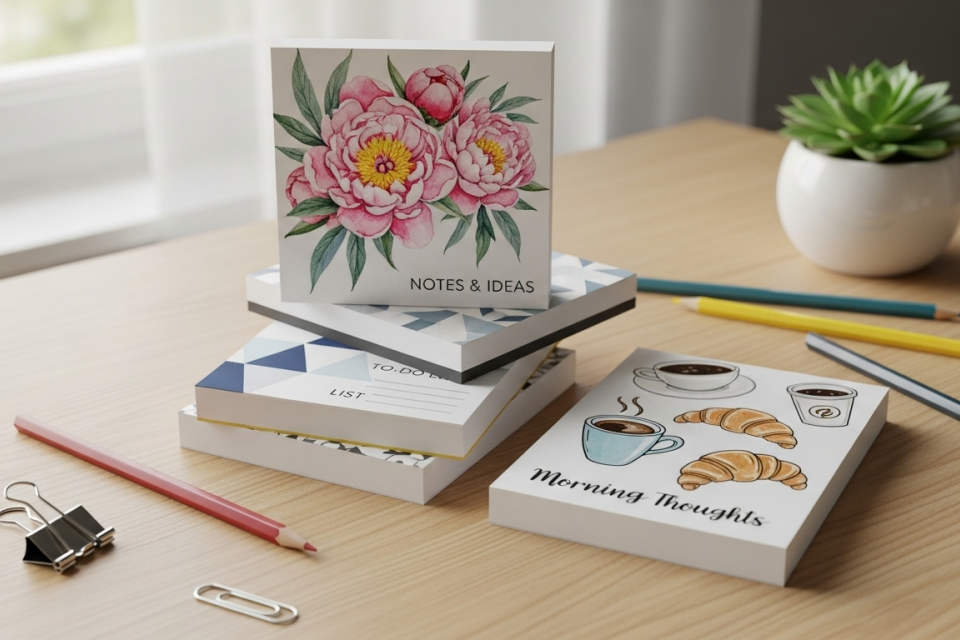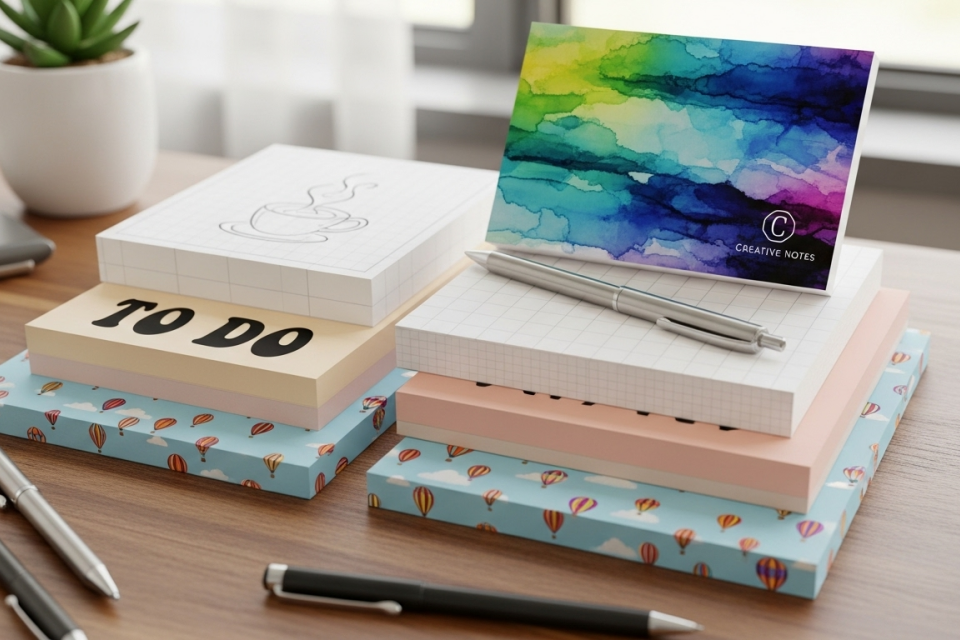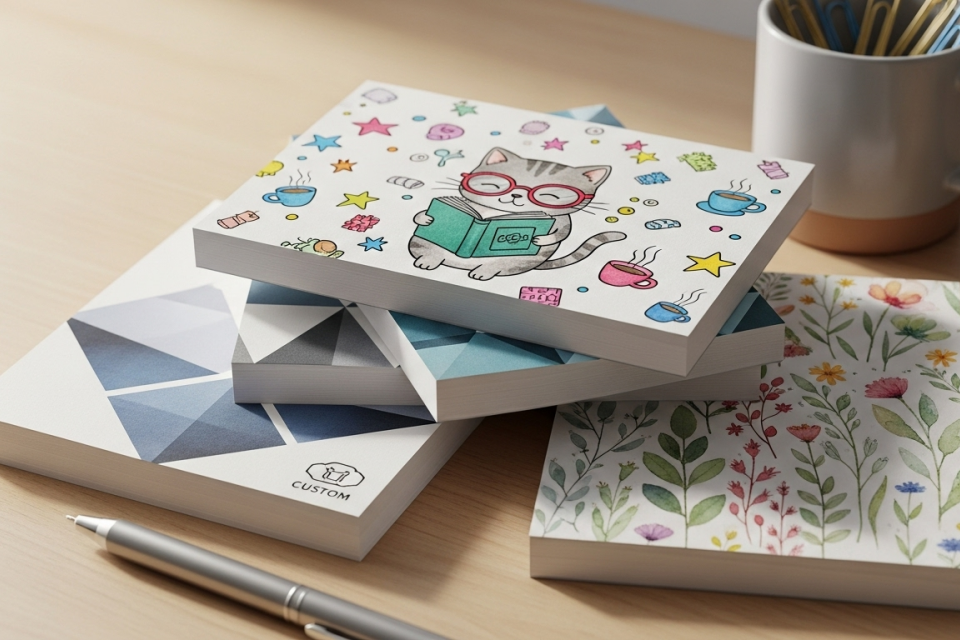What Are Custom Note Cubes?
Explore custom note cubes, versatile stationery for branding and organization. Our guide covers their design, materials, production, and marketing impact.
Summary
Custom note cubes, also known as personalized sticky notes, are versatile stationery products designed to enhance organization and creativity across various settings. Typically measuring 3.5 by 3.5 inches, these cubes consist of a stack of adhesive sheets that can be customized with unique designs, colors, and branding elements, making them both functional and aesthetically appealing. Their evolution reflects a broader trend towards personalization in stationery, influenced by technological advancements and changing communication styles since the 1970s, when the demand for distinctive stationery items began to rise.
Notably, custom note cubes have transcended their primary role as simple note-taking tools to become essential desk accessories in both personal and professional environments. They are increasingly used in educational settings to support learning, in workplaces for brainstorming and project management, and as effective promotional items that reinforce brand visibility for businesses. Furthermore, the integration of eco-friendly materials and sustainable practices in their production underscores a growing consumer preference for environmentally conscious products, reflecting broader cultural movements towards sustainability and responsible consumption.
While the custom note cube market has flourished, it is not without controversies. Some critics argue that the rise of digital alternatives may threaten the relevance of physical note-taking products. However, the enduring popularity of custom note cubes indicates a persistent demand for tangible organizational tools that complement digital methods and enhance personal expression. As consumers increasingly seek products that align with their values, the custom note cube industry continues to adapt, offering innovative designs that celebrate cultural influences and individual identity.
Table of Contents
History
The concept of custom note cubes can be traced back to the evolution of stationery and personalized communication. As the demand for unique and functional stationery items grew, especially in the 1970s, companies began to recognize the importance of personalization in their offerings. During this era, handwritten letters became a prominent form of communication, leading to an increased interest in customized stationery products.
The rise of technology and changes in communication styles throughout the 2000s further transformed the stationery industry, as email and social media started to overshadow traditional forms of note-taking. Despite these challenges, the adaptability of stationery manufacturers allowed for creative innovations, paving the way for products like custom note cubes to gain popularity.
Japanese stationery also contributed to the rich history of note-taking materials. During the Meiji era, Japan began modernizing its production methods by incorporating Western techniques while preserving traditional craftsmanship. This blend created a unique cultural artifact that symbolizes resilience and creativity in personal expression, which can be seen today in various stationery forms, including note cubes.
Custom note cubes have since evolved into essential desk accessories, prized for their functionality and the ability to enhance branding efforts in professional settings. They serve diverse purposes, from personal reminders to promotional tools for businesses, reflecting an enduring trend towards customization and personalization that continues to influence the stationery market today.

Design and Features
Custom note cubes are versatile organizational tools designed to enhance productivity and creativity in various settings. Their design typically incorporates a stack of sheets, each measuring 3.5 by 3.5 inches, with an adhesive strip at the top, allowing users to easily tear off sheets as needed. The customization of these cubes extends beyond the size and shape; users can personalize the design displayed on all four edges of the sticky pad, making them an effective promotional item for businesses.
Material and Construction
The primary material used in custom note cubes is paper, which can vary from standard pulp to high-grade options like acid-free or recycled paper. The choice of paper not only affects the durability of the notes but also their environmental impact. Many manufacturers are increasingly adopting eco-friendly practices by using recycled materials and sustainable processes, resonating with consumers who prioritize responsible consumption. This shift indicates a broader cultural movement towards sustainability in product design.
Functionality and Usability
One of the standout features of custom note cubes is their convenience and usability. The stack format allows for easy access to multiple notes while maintaining a compact design. They are often used in workspaces and classrooms, serving as an aid for brainstorming sessions, group activities, and individual note-taking. Their functionality is enhanced by their low-cost production compared to other promotional items, making them an attractive option for businesses looking to increase brand visibility while remaining budget-friendly.
Aesthetic Variations
Custom note cubes come in a variety of colors and designs, catering to diverse preferences. The available color options range from traditional hues like white and yellow to vibrant shades such as pink, blue, and green, allowing for personalization that aligns with individual or brand aesthetics. Furthermore, specific collections may focus on thematic designs, enhancing their appeal as both functional tools and decorative items in any environment.

Applications
Custom note cubes, also known as personalized sticky notes, serve various practical and promotional purposes across different sectors.
Educational Settings
In educational contexts, custom note cubes are increasingly being used to support students’ learning processes. Teachers and educational institutions can customize these note cubes with school logos or motivational quotes to foster a sense of belonging and school spirit among students. Additionally, students can utilize them for organizing their study materials, summarizing lecture notes, or collaborating on group projects, thereby enhancing their academic experience.
Personal and Professional Use
In personal settings, custom note cubes are a popular choice for jotting down reminders, messages, or ideas. Their customizable nature allows individuals to select designs that reflect their personality or branding, making them not only functional but also aesthetically pleasing. In professional environments, these sticky notes can facilitate quick communication and organization. Users often utilize them for brainstorming sessions, project management, and as tools for enhancing productivity in daily tasks.
Marketing and Branding
From a marketing perspective, custom note cubes are an effective advertising medium. Businesses can use them as promotional items, ensuring that their brand remains visible to clients and partners. By providing clients with personalized sticky notes printed with company logos and contact information, businesses can achieve multiple impressions at a low cost per impression, reinforcing brand recognition. This approach is particularly effective in keeping essential information in front of potential customers consistently.
Digital Integration
With the rise of digital note-taking, some users have transitioned to using tablet devices alongside custom note cubes. This blend of digital and physical note-taking allows for more personalized and adaptable methods of capturing information. Custom note cubes can complement digital tools by offering a tangible way to organize thoughts and ideas, providing users with flexibility in how they manage their notes.

Production and Manufacturing
Overview of Production Processes
The production of custom note cubes involves various printing techniques and materials to create high-quality, functional stationery products. These processes have evolved to incorporate advanced technologies, ensuring efficiency and customization in the final products.
Printing Techniques
There are several key printing processes used in the production of custom note cubes:
- Thermography: This technique utilizes heat to fuse ink with a resin-like powder, resulting in a raised lettering effect. It is a popular choice for invitations and provides an elegant appearance at an affordable cost.
- Digital Printing: In this method, images are sent directly to the printer from digital files, such as PDFs or graphics software. Digital printing is cost-effective for smaller quantities and yields high-quality prints, making it ideal for customized products like note cubes.
- Dye Sublimation: This is a heat transfer printing process that applies dye onto various materials, commonly used for fabrics and specially coated surfaces. It offers vibrant color options and durability, enhancing the appeal of custom note cubes.
Sourcing Materials
Selecting the right materials is crucial for the production of custom note cubes. The choice of paper quality, adhesive, and printing inks directly affects the product’s durability and visual appeal. Businesses often conduct a thorough assessment of suppliers to ensure the reliability and quality of the materials used in their products.
Supplier Relationships
Establishing strong relationships with suppliers is essential in the manufacturing process. Companies must verify the credentials of potential suppliers and negotiate terms effectively, including pricing and minimum order quantities (MOQ). It is also advisable to request product samples before placing bulk orders to evaluate quality.
Managing Production Logistics
Efficient management of production logistics is vital for meeting customer demands and maintaining profitability. Companies must ensure optimal management of multi-warehouse sites and leverage advanced business management tools to streamline inventory management and order fulfillment processes. This includes utilizing real-time data and tailored software solutions to enhance visibility across the supply chain.
Challenges in Production
Despite advancements in production methods, the stationery industry faces significant challenges, such as rising competition and cost pressures. Suppliers must adopt innovative practices and diversify their product offerings to differentiate themselves in a crowded market. Additionally, overreliance on single suppliers can pose risks to the supply chain, making it essential to diversify sourcing strategies.

Environmental Impact
The environmental impact of custom note cubes is becoming an increasingly significant consideration for both consumers and manufacturers. As the demand for sustainable products rises, businesses are looking for ways to minimize their ecological footprint while still delivering quality promotional items. Over half of US consumers express concern about the environmental effects of packaging and promotional products.
Sustainability in Materials
One key aspect of reducing the environmental impact of custom note cubes is the choice of materials used in their production. Many companies are now opting for recycled or sustainable materials, reflecting a growing preference among consumers for eco-friendly products. Research indicates that 72% of people desire items made from recycled or sustainable sources, highlighting the importance of environmentally conscious decision-making in product development. Using materials such as recycled paper not only conserves resources but also appeals to the eco-aware customer base.
Production Practices
To further enhance sustainability, businesses can implement renewable energy in their production processes and adopt waste reduction strategies, such as recycling and using energy-efficient technologies. These practices not only lower the carbon footprint associated with the manufacturing of note cubes but also signal to consumers that the brand is committed to environmental responsibility. In fact, 85% of environmentally conscious consumers actively seek out products from brands that transparently communicate their sustainability practices.
Consumer Engagement and Brand Image
Integrating eco-friendly practices into the production of custom note cubes can significantly boost brand perception. As consumers increasingly prefer brands that prioritize sustainability, companies that adopt environmentally friendly methods can strengthen customer loyalty and foster a positive brand image. Furthermore, by offering promotional items that showcase a commitment to sustainability, brands can create memorable experiences that resonate with eco-aware audiences.
Cultural Significance
Custom note cubes, while primarily utilitarian, serve as a canvas for cultural expression and identity. The stationery market has evolved to reflect global influences, with cultural motifs enhancing the aesthetic and functional value of products like note cubes. As consumers seek to personalize their stationery, the integration of diverse cultural elements in designs becomes increasingly significant, fostering a sense of connection and appreciation for different traditions.
Influence of Global Cultures
The impact of various global cultures on stationery design is profound. For example, Japanese minimalism emphasizes simplicity and functionality, resulting in note cubes that promote clarity and focus. This style is deeply rooted in Zen philosophy, reflecting a tranquil approach to everyday tasks. In contrast, Indian-inspired designs often incorporate intricate patterns and vibrant colors, adding a layer of exoticism and creativity that can transform a simple note cube into a striking piece of art.
Promoting Cultural Understanding
Manufacturers of custom note cubes that feature designs from diverse cultures help promote cultural understanding and appreciation. By celebrating the artistic heritage of various regions, these products not only serve practical purposes but also educate consumers about the artistic traditions of the world. The integration of motifs from African art, known for its bold colors and geometric patterns, also exemplifies how cultural narratives can enhance everyday items, making them more engaging and meaningful.
Personal Expression and Sustainability
As the demand for personalization rises, consumers gravitate towards note cubes that resonate with their personal style and cultural identity. This growing trend aligns with a broader movement towards sustainability and ethical practices in the stationery industry. Many brands are increasingly adopting eco-friendly materials and ethical manufacturing processes, reflecting modern consumers’ values concerning environmental impact. The combination of cultural significance and sustainable practices in the design of custom note cubes highlights their role as a form of personal expression that also respects the planet.
Consumer Response
Consumer response to promotional items, such as custom note cubes, is significantly positive, illustrating their effectiveness in marketing strategies. Research indicates that nearly three out of four consumers engage positively with personalized offers, recommendations, or experiences related to these items. In a crowded marketplace, brand favorability is crucial; 83% of consumers are more inclined to do business with brands that provide promotional products, highlighting their influence on buying decisions.
Promotional items, including custom note cubes, can effectively enhance brand loyalty, often regarded as the “gold standard” of customer value. Studies show that a remarkable 76.1% of consumers remember a brand due to promotional items they have received, surpassing recall rates associated with traditional advertising media. Furthermore, 66% of consumers recall a brand after receiving a product in the past year, emphasizing the longevity of the promotional item’s impact on brand recognition.
The psychology behind these promotional gifts plays a crucial role in shaping consumer perceptions. These items serve as miniature billboards, increasing brand visibility. A study by the Promotional Products Association International (PPAI) found that 89% of consumers could recall the advertiser on a promotional product received within the last two years, showcasing the superior recall ability compared to other advertising forms.
Moreover, the emotional connections fostered by promotional products are vital for long-term loyalty. Approximately 79% of recipients feel appreciated when receiving such items, which enhances their connection to the brand. This emotional resonance is essential for driving repeat business; 85% of consumers are more likely to choose a company after receiving a promotional item.
In terms of cost-effectiveness, promotional products like custom note cubes provide significant value. The cost per impression is notably low, sometimes as little as 1/10 of a cent, and these items often remain in consumers’ homes for over eight months, maximizing exposure and brand retention. The trend towards personalized promotional products suggests that businesses can cultivate deeper connections with their audience, thereby driving brand recognition and loyalty in a competitive environment.
